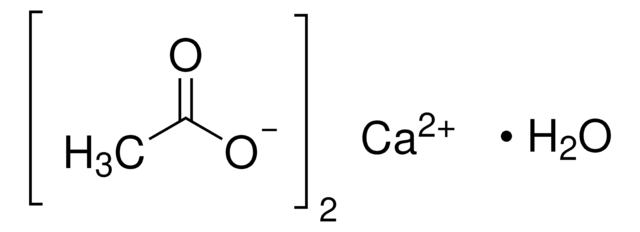PHR1362
Calcium Acetate
Pharmaceutical Secondary Standard; Certified Reference Material
Synonym(s):
Calcium acetate
About This Item
Recommended Products
grade
certified reference material
pharmaceutical secondary standard
Quality Level
Agency
traceable to USP 1086334
API family
calcium acetate
CofA
current certificate can be downloaded
technique(s)
HPLC: suitable
gas chromatography (GC): suitable
impurities
~1% Acetic acid
application(s)
pharmaceutical (small molecule)
format
neat
storage temp.
2-30°C
SMILES string
CC(=O)O[Ca]OC(C)=O
InChI
1S/2C2H4O2.Ca/c2*1-2(3)4;/h2*1H3,(H,3,4);/q;;+2/p-2
InChI key
VSGNNIFQASZAOI-UHFFFAOYSA-L
Looking for similar products? Visit Product Comparison Guide
General description
Pharmaceutical secondary standards for application in quality control, provide pharma laboratories and manufacturers with a convenient and cost-effective alternative to the preparation of in-house working standards.
Application
Footnote
related product
Storage Class Code
11 - Combustible Solids
WGK
WGK 1
Flash Point(F)
Not applicable
Flash Point(C)
Not applicable
Choose from one of the most recent versions:
Already Own This Product?
Find documentation for the products that you have recently purchased in the Document Library.
Customers Also Viewed
Our team of scientists has experience in all areas of research including Life Science, Material Science, Chemical Synthesis, Chromatography, Analytical and many others.
Contact Technical Service








